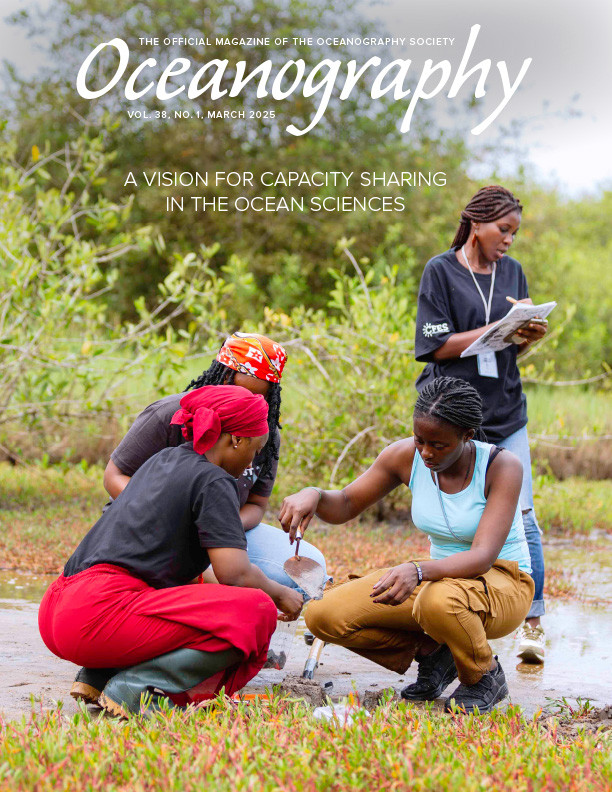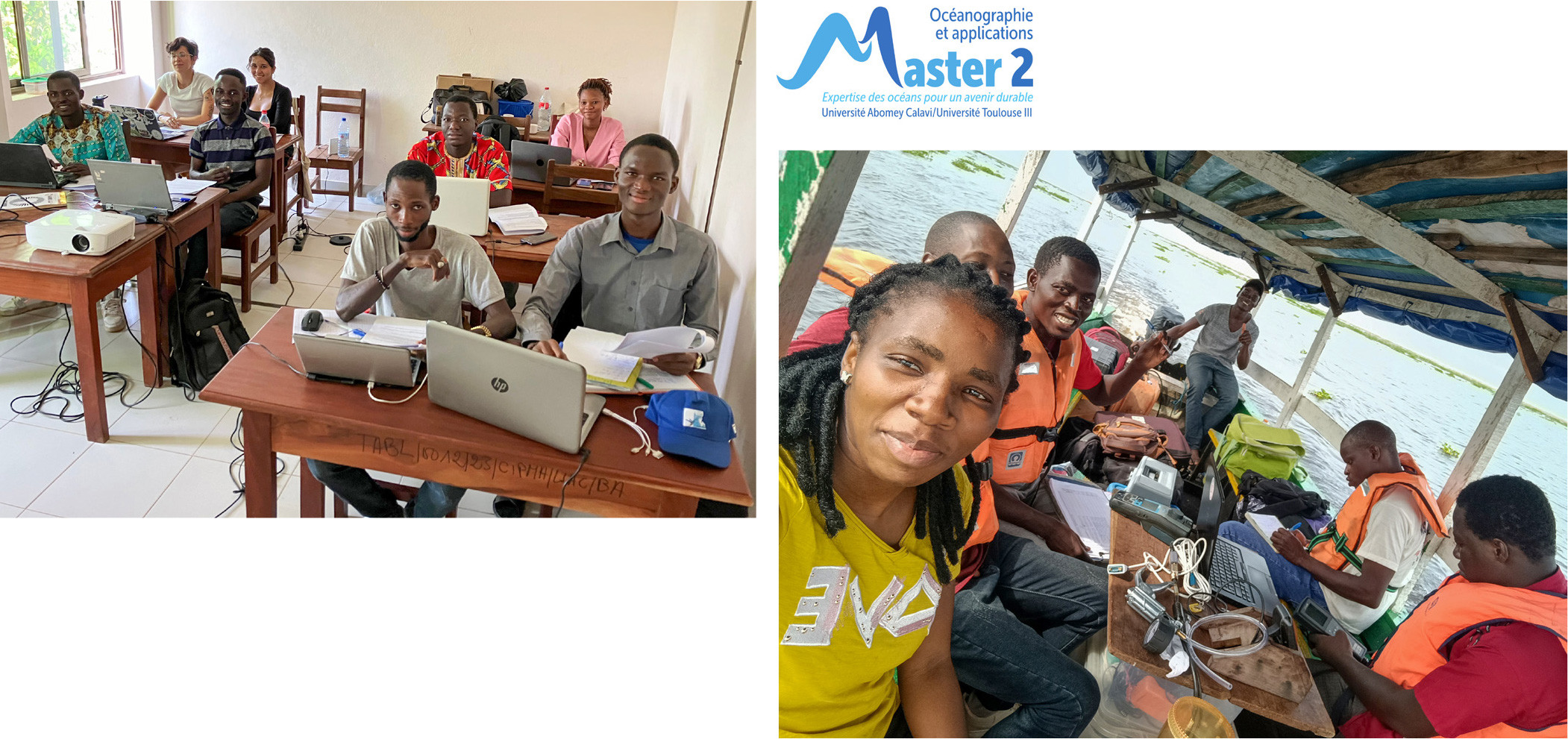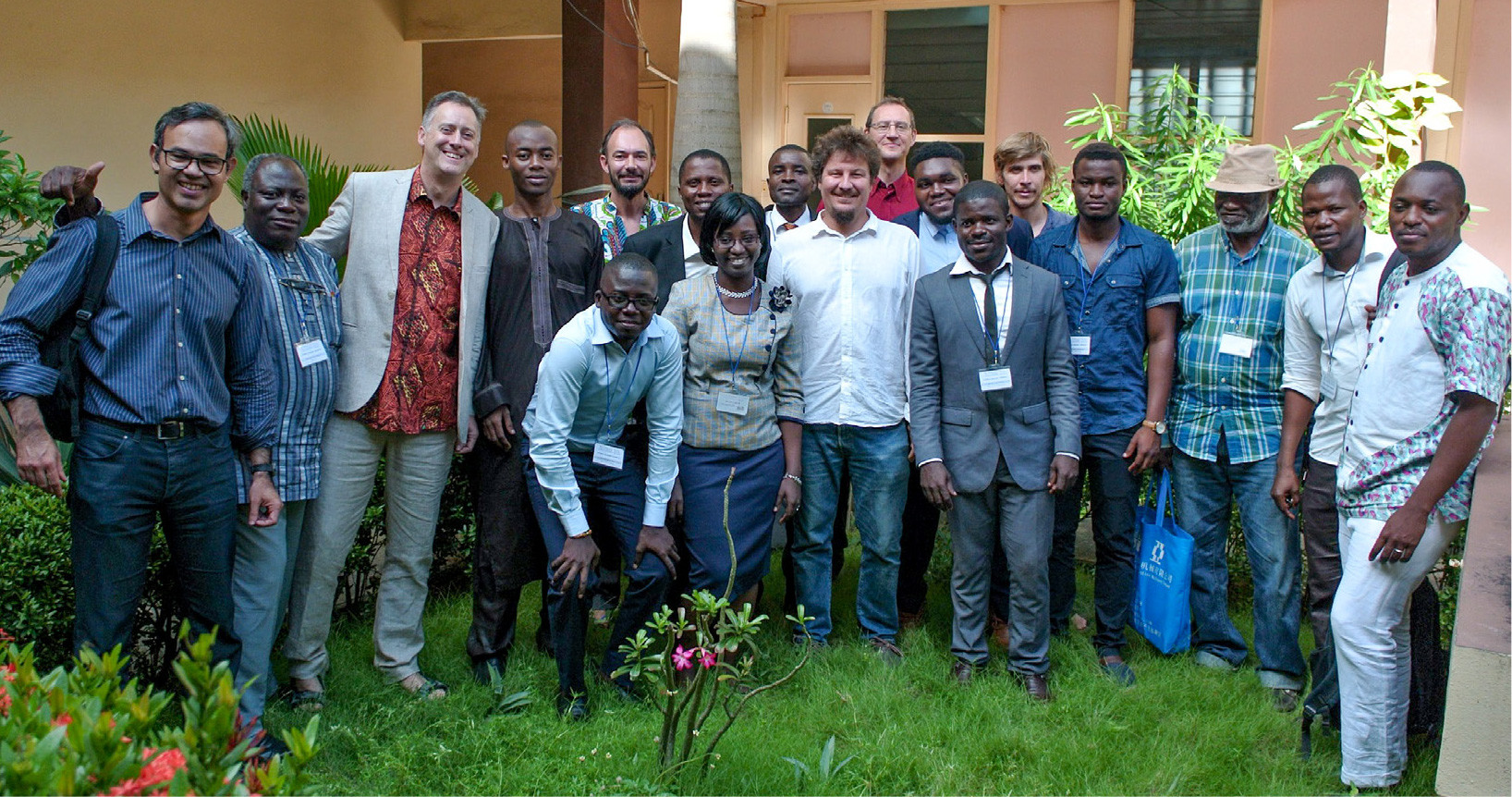Full Text
Origins
The state and dynamics of the oceans and seas that surround Africa are changing at an increasing pace due to anthropogenic pressures. The livelihoods of many Africans depend on fishing and ocean-driven monsoon rains, and some African coastlines are eroding rapidly, potentially with catastrophic results to populations and infrastructure. Yet few African scientists are prepared to engage in ocean-related research. To address this deficit, the Master’s program in Oceanography and Applications1 was launched in 2008 in Benin, targeting the West African region. This program is designed to build capacity in support of regional research programs in oceanography such as PIRATA (Prediction and Research Moored Array in the Tropical Atlantic; Bourlès et al., 2019), AMMA-EGEE (African Monsoon Multidisciplinary Analyses - Oceanic Circulation and Ocean-Atmosphere Exchanges in the Gulf of Guinea; Redelsperger et al., 2006; Bourlès et al., 2007), and PROPAO (Regional Program of Physical Oceanography in West Africa; Sohou et al., 2020).
The main goals of the master’s program are to train the next generation of ocean scientists and to build capacity in local institutions for research and applications in the civil, industrial, and commercial sectors. Specific objectives include developing research teams in West Africa, promoting research activities, and reinforcing regional expertise and collaboration in the domains of the environment, climate, and oceanography. The program also aims to raise consciousness at all levels concerning the important environmental challenges currently facing the region and strongly influencing its future development. While fostering a transfer of competence from visiting instructors to African teaching staff in the region, it has grown over the past 15 years into a unique regional education program that welcomes students from West and Central Africa.
1 https://icmpa.net/cipma/departments-details.php?indice=3; https://www.univ-tlse3.fr/decouvrir-nos-diplomes/master-parcours-oceanographie-et-applications-oa
Operation and Collaboration
Since its beginnings, the master’s program has been a joint operation between the French Research Institute for Sustainable Development (IRD) and the UNESCO International Chair in Mathematical Physics and Applications (ICMPA) at the University of Abomey Calavi (UAC) in Cotonou, Benin. The University of Toulouse III Paul Sabatier (UT3), France, has been a core partner since the start of the program and, beginning with the academic year 2011–2012, students graduate with a joint master’s degree from UAC and UT3.
The host organization, ICMPA, supplies the foundation for instruction, with lecturers from outside Benin delivering their courses through one-week intensive study periods. They mostly include French professors from UT3 and research staff from IRD and CNRS (National Center for Scientific Research), with additional academics from University Félix Houphouët-Boigny (Côte d’Ivoire), University of Cape Coast (Ghana), University of Kara (Togo), as well as contributions from University of Recife (Brazil) and Alfred Wegener Institute (Germany). Second-year master’s-level training is provided annually to about 10 students on all aspects of physical oceanography, from the fundamental dynamics of ocean currents, waves, and tides to the effects of ocean circulation on biogeochemistry, biology, and sediments (Figure 1). The syllabus also includes courses on satellite observations, computer programming, and numerical modeling. Although most of the students are from French-speaking countries, the program is also open to English-speaking students, thanks to a bilingual approach in the oral/written teaching material. Hands-on training in oceanographic measurements is also done in a coastal lagoon (Nokoué) as part of an international research program led by one of the program’s alumni. The training is divided into two semesters, the first for lectures and the second for internships, which can be done locally or overseas (funding permitting).
|
|
Principal expenses are travel and accommodation for visiting professors, along with logistics and grant support for students, who benefit from a monthly allowance. IRD has been a major funder of the program since its creation. From 2009 to 2016 we also benefited from a partnership with the Total Energies Foundation that involved both teaching and financial support. In recent years, the EU Erasmus+ program provided support for lecturers and student exchanges within a consortium of French universities (Toulouse, Paris, Brest, Grenoble). The German Academic Exchange Service (DAAD) offered MSc and PhD scholarships to selected students. The European research project “South and Tropical Atlantic climate-based marine ecosystem prediction for sustainable management” (TRIATLAS, https://triatlas.w.uib.no/) supported travel expenses through its Cross-Atlantic Network of Excellence in Marine Science (CANEMS). The master’s program is closely associated with the regional Tropical Atlantic Climate and Coastal Variability (TACCOVAR, https://taccovar-2017-79.webself.net) conference, co-organized every year by ICMPA and IRD since 2014: one day is dedicated to the students’ internship defenses, coinciding with the welcoming week for the new class of master’s program students (Figure 2).
|
|
Achievements
The master’s program in Benin is the first West African diploma in oceanography to be twinned with a European university. To date, it has trained 150 students from 9 countries (Benin, Togo, Nigeria, Côte d’Ivoire, Ghana, Cameroon, Senegal, Congo, and France), 20% of whom are women (Figure 3), an increasing percentage in recent years. More than half of the alumni are either pursuing or have already obtained PhDs in countries spread over four continents, including Benin, Côte d’Ivoire, Nigeria, Cameroon, Ghana, Senegal, South Africa, France, Germany, Italy, Ireland, Scotland, Brazil, Canada, United States, and China. At least 85 alumni are either in full-time employment or are still studying. Some alumni currently hold permanent academic positions in Benin, Ghana, Côte d’Ivoire, Togo, Cameroon, and Congo, and some of these individuals have come full circle, lecturing in the master’s program and taking responsibility for its local management. Students and alumni have contributed to over 240 publications in international scientific journals. The training program has led to stronger collaborations between coastal countries in West and Central Africa, sustained by the TACCOVAR conference, and has enhanced African contributions to international programs such as PIRATA, PREFACE, TRIATLAS, and POGO (Partnership for Observation of the Global Ocean).
|
|
Lessons Learned
While running this master’s program for more than 15 years, through successes and challenges, we have learned a few lessons about the program’s needs:
- Broad Advertising and Scholarships. To attract enough qualified applicants, it is essential to advertise broadly and to offer scholarships. Many African students would struggle to support themselves during the program’s year of full-time study, especially those coming from outside Benin, where the program is based.
- Alignment with Regional Needs. The curriculum should fit the needs of the local and regional job market, enabling some alumni to secure employment locally and contribute to their countries’ development. Otherwise, given the narrow academic sector in West Africa, many alumni may emigrate to Western countries, with little chance of returning back home.
- Value of Western Accreditation. Obtaining a master’s degree from a Western university greatly helps alumni to find PhD opportunities worldwide.
- Importance of North-South Collaborations. Establishing strong scientific collaborations within the educational team has been crucial for the program’s long-term success; these collaborations were further strengthened when alumni joined the program team.
Evolution and Future Plans
Building on the lessons learned, we have evolved toward a more skill-oriented approach, and introduced a new syllabus in 2022. The primary objectives are to strengthen employment opportunities by increasing the emphasis on skills relevant to non-academic regional needs, to deepen the link between the first- and second-year master’s programs offered by ICMPA to improve the influx of well-qualified candidates, and to progressively transfer the management responsibilities of the program to African research and university staff who hold permanent positions. Most courses now pair French and African professors. New offerings, such as courses on ocean data for marine professionals provided by Mercator Ocean International, and on marine environmental law, related to the blue economy sector, have been introduced. A recent survey among alumni confirmed that the master’s program opens up excellent prospects for international careers in oceanographic research, and it also revealed challenges for direct regional employability. To address this, alumni recommended more training in project management, entrepreneurship, and software tools commonly used by private companies. They also expressed interest in establishing a formal alumni network by leveraging social media platforms. This feedback will be taken into account. However, the master’s program faces an immediate challenge due to funding shortages. Securing new partners, particularly for scholarships aimed at African students, is critical for the program’s sustainability.




